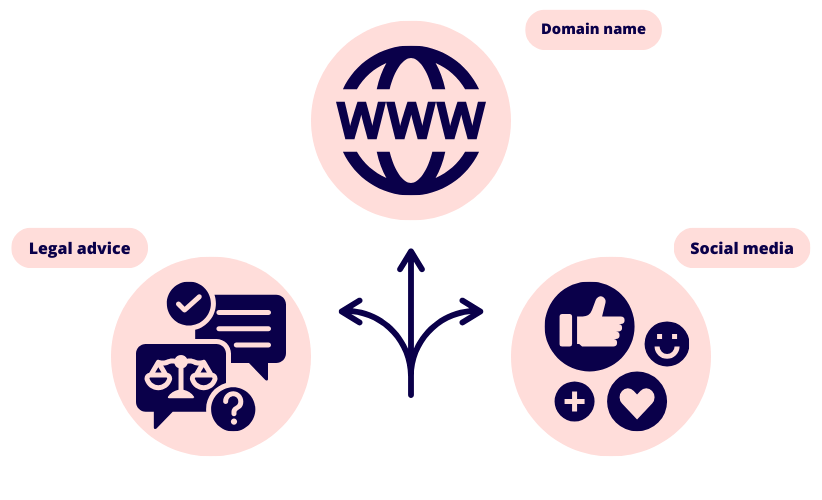TABLE OF CONTENTS
- What is a business name?
- Register business name: Do you really need to?
- Steps to register a business name in Australia
- Displaying and using your business name
- Protecting your business name with a trade mark
- Renewing your existing business names
- Other considerations for registering a business name
- Top benefits of registering a business name
- Common mistakes to avoid with business name registration
Your business name is more than just a label. It’s something that should represent your brand and define your identity. More than that, it sets the tone for how your customers should perceive you. In Australia, registering a business name is a straightforward process, but there are some things you should consider and a few steps you should follow to make sure you can protect your name.
Our handy guide will break down everything you need to know about registering a business name in Australia.
What is a business name?
A business name is the name under which your business trades and interacts with customers. In other words, it’s very important to get it right! It will appear on your official paperwork, invoices, signage, marketing materials, emails, logos, and so much more. Whether it’s a simple name like ‘John Smith Carpentry’ or a more direct one like ‘EcoBuilders Australia, ’ your business name is central to your brand identity.
In Australia, you need to register your business name unless you’re operating under your legal name (for a sole trader) or your company name (for a registered company). Just remember that registering your business name doesn’t grant exclusive rights to its use. To secure full legal protection and be able to conduct business, you will need to register it as a trademark.
Register business name: Do you really need to?
Not every business will need to use a business registration service for their name. Below are a couple of examples to help clarify when registration is actually required:
- No registration needed: If you’re operating as a sole trader or in a partnership under your personal legal name(s) (e.g. ‘Jane Doe’ or ‘Jane Doe and John Smith’), you don’t need to register a business name. However, this will change if you decide to expand your business in future.
- Registration required: If you add other words to your name (e.g. ‘Jane Doe Landscaping’), operate under a completely different name (e.g. ‘Green Thumb Landscaping’) or if your company works under a trading name separate from the registered legal name, you must register the business name.
Steps to register a business name in Australia
![]()
1. Choose the right name
This is about more than just picking something catchy. You’ll want your business name to reflect your brand as well as avoid any potential legal issues. Think about the following:
- Availability: Use the Australian Securities and Investments Commission (ASIC) business registration service to check if your preferred business name is available.
- Trademarks: Use IP Australia’s TM Checker to check that the name isn’t already trademarked by someone else.
- Suitability: Choose a name that’s memorable, easy to spell, relevant to your brand and lines up with your values.
2. Check for restrictions
Some business names will be restricted or considered undesirable. In these cases, you’ll need either special approval or have to choose something different. For example, you can use:
- Names that imply you are associated with a government entity (e.g. “Royal Tax Solutions”).
- Words requiring industry permissions, like ‘architect’ or ‘bank’.
- Offensive or misleading names.
3. Register an Australian Business Number (ABN)
Before registering your business name, you’ll need an Australian business number (ABN) for tax purposes and other business dealings. You can apply for an ABN online if you don’t already have one.
4. Register your business name
The registration process for getting a business name is easy:
- ASIC Connect: If you already have an ABN.
- Business Registration Service: A one-stop shop where you can register your ABN, business name and other tax registrations simultaneously.
Registration fees are:
- $44 for one year
- $102 for three years
Once registered, you’ll get a confirmation email and a record of your registration and business name details.
Displaying and using your business name
Once your business name is registered, you are required to use it consistently across all of your business operations, including things like:
- Invoices and receipts
- Contracts and quotes
- Marketing materials and websites
- Signage at your business premises (if you have a physical store/office)
While you don’t need to display your registration certificate, the business name must be clearly visible to customers wherever you operate.
Protecting your business name with a trade mark
Just because you register a business name, that doesn’t automatically give you exclusive rights to it. To make sure no one else can use your name for similar service offerings, you’ll want to apply for a trademark. This gives you much better legal protection and means you have exclusive rights to your name, logo and other branding elements in Australia.
Renewing your existing business names
Your business name registration needs to be renewed periodically – either annually or every three years depending on your initial choice (see prices above). ASIC will send you a renewal notice at least 30 days before the renewal date, so make sure you get it sorted on time to avoid potentially having your business name cancelled.
If you have multiple business names registered, you can consolidate your renewal dates to make managing the admin a little easier.
Other considerations for registering a business name

Register a domain name
Even if you’re not ready to build a website, it’s a good idea to buy a domain name that matches your business name. When you’re ready to establish an online presence or build an e-commerce store, you’ll be well prepared.
Social media handles
Lock in your business name on popular social media platforms like Instagram and Facebook. Consistent branding across all your channels is the best way to generate brand recognition and credibility in the market.
Legal advice
If you’re not sure about certain aspects of your business name or its implications, it’s well worth seeking out professional legal advice. They can talk to you about how to prevent any potential disputes or compliance issues related to how your business operates.
Top benefits of registering a business name
- Legitimacy: A registered business name establishes your brand as a credible operation in the eyes of customers (and potential partners).
- Compliance: Registering your business name is important to stay compliant with Australian law.
- Brand recognition: A memorable business name builds brand awareness and, hopefully, repeat business.
- Easy access to essential business services: A registered business name is required for many services, such as banking and supplier accounts.
Common mistakes to avoid with business name registration
- Skipping the trademark check: Even if your preferred name is available to register, someone with a trademark on the same name could legally challenge your use of it.
- Ignoring future scalability: Choose a name that allows for growth if you plan to expand your offerings or target markets. For example, don’t call your business ‘The Solo Plumber’ if you plan to grow your business and onboard new employees.
- Forgetting to renew: Missing the renewal deadline could potentially result in the cancellation of your business name. And no business owner wants to deal with that unnecessary headache.
Every owner should consider registering a business name when establishing their brand. Yes, it will take a bit of time and administrative work, but having a great business name can build a solid foundation for long-term success.
Don’t forget to think about trademarks for extra protection, and always renew your registration on time to retain your business name rights.























